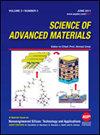Effects of Calcitonin on Apoptosis and B-Cell Lymphoma 2 Expression in Knee Osteoarthritis Articular Chondrocytes
IF 0.9
4区 材料科学
引用次数: 0
Abstract
Knee osteoarthritis (KOA) is a prevalent joint disorder characterized by articular cartilage degeneration and apoptosis. This research was aimed to demonstrate effects of calcitonin (CT) on apoptosis and Bcl-2 in KOA articular chondrocytes. In vitro cellular experiments were conducted using articular chondrocytes obtained from KOA patients, with a portion of the cells undergoing passaging and proliferation culture. The remaining cells were rolled into control group (normal chondrocytes), KOA group (chondrocytes from arthritis joints), and CT group (chondrocytes from arthritis joints treated with CT). Control and KOA groups were treated with an equivalent amount of saline solution. Apoptosis and Bcl-2 protein expression levels were assessed in each group to evaluate the impact of CT on articular chondrocytes. It was revealed that proliferation rate of human chondrocytes decreased with increasing passage number, and the exponential growth phase was shorter. After day 6, the proliferation rate drastically increased, exhibiting an exponential growth trend. Relative to KOA group, the CT group demonstrated a notable reduction in apoptosis of articular chondrocytes ( P <0.05). Bcl-2 protein level was greatly upregulated in CT group ( P < 0.05). In short, CT can inhibit apoptosis of articular chondrocytes and promote Bcl-2 expression, thereby contributing to the stability and survival of articular chondrocytes. In summary, CT has a positive effect on apoptosis and Bcl-2 expression in KOA articular chondrocytes.降钙素对膝关节骨性关节炎关节软骨细胞凋亡和b细胞淋巴瘤2表达的影响
膝关节骨性关节炎(KOA)是一种以关节软骨退变和细胞凋亡为特征的常见关节疾病。本研究旨在探讨降钙素(CT)对KOA关节软骨细胞凋亡和Bcl-2的影响。利用KOA患者关节软骨细胞进行体外细胞实验,部分细胞进行传代和增殖培养。其余细胞依次分为对照组(正常软骨细胞)、KOA组(关节炎软骨细胞)和CT组(经CT处理的关节炎软骨细胞)。对照组和KOA组均给予等量生理盐水处理。观察各组细胞凋亡及Bcl-2蛋白表达水平,评价CT对关节软骨细胞的影响。结果表明,随着传代次数的增加,人软骨细胞的增殖速率降低,指数生长期缩短。第6 d后,增殖率急剧上升,呈指数增长趋势。与KOA组相比,CT组关节软骨细胞凋亡明显减少(P <0.05)。CT组Bcl-2蛋白水平明显上调(P <0.05)。总之,CT可以抑制关节软骨细胞的凋亡,促进Bcl-2的表达,从而有助于关节软骨细胞的稳定和存活。综上所述,CT对KOA关节软骨细胞凋亡和Bcl-2表达有积极影响。
本文章由计算机程序翻译,如有差异,请以英文原文为准。
求助全文
约1分钟内获得全文
求助全文
来源期刊

Science of Advanced Materials
NANOSCIENCE & NANOTECHNOLOGY-MATERIALS SCIENCE, MULTIDISCIPLINARY
自引率
11.10%
发文量
98
审稿时长
4.4 months
 求助内容:
求助内容: 应助结果提醒方式:
应助结果提醒方式:


